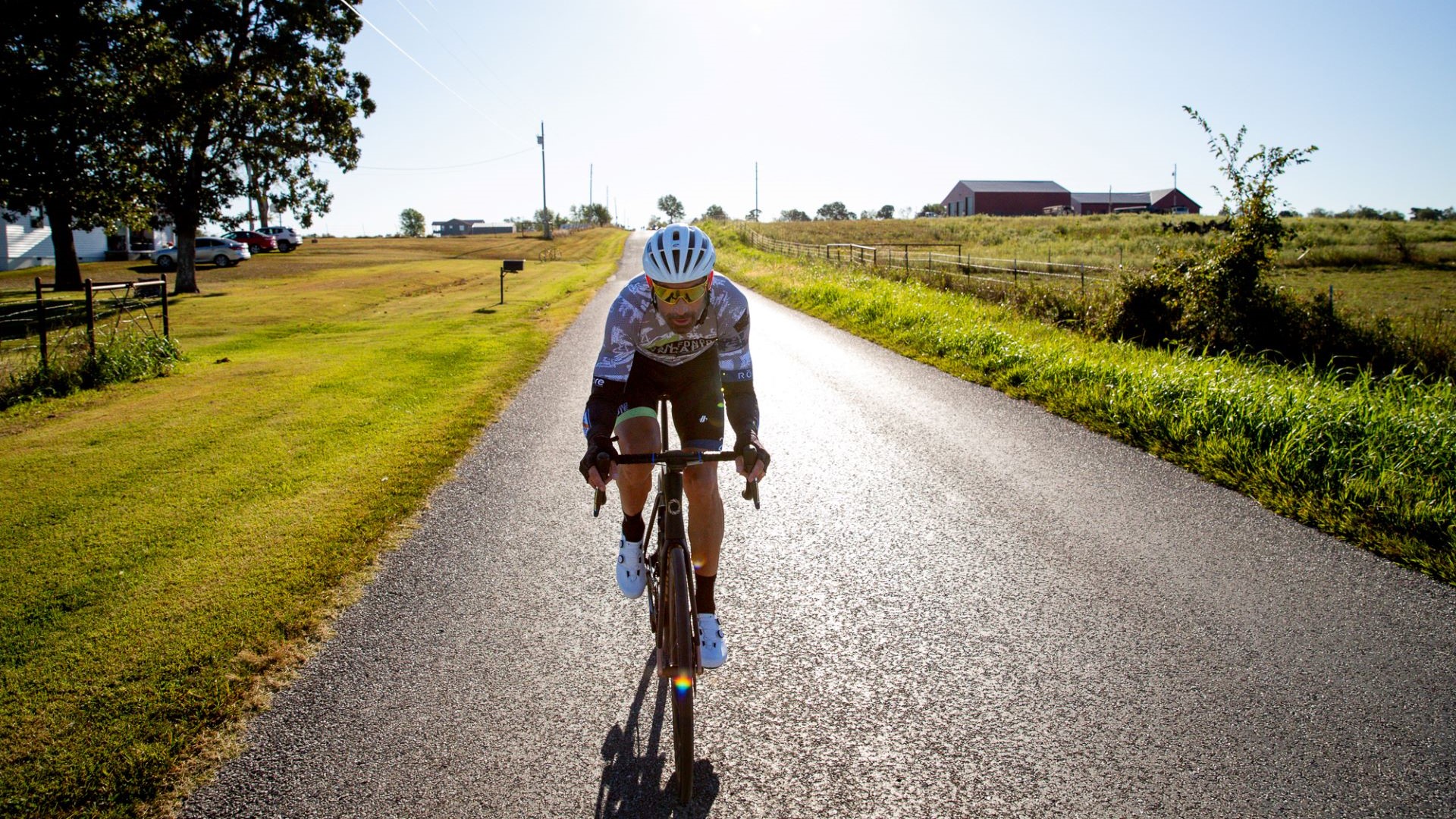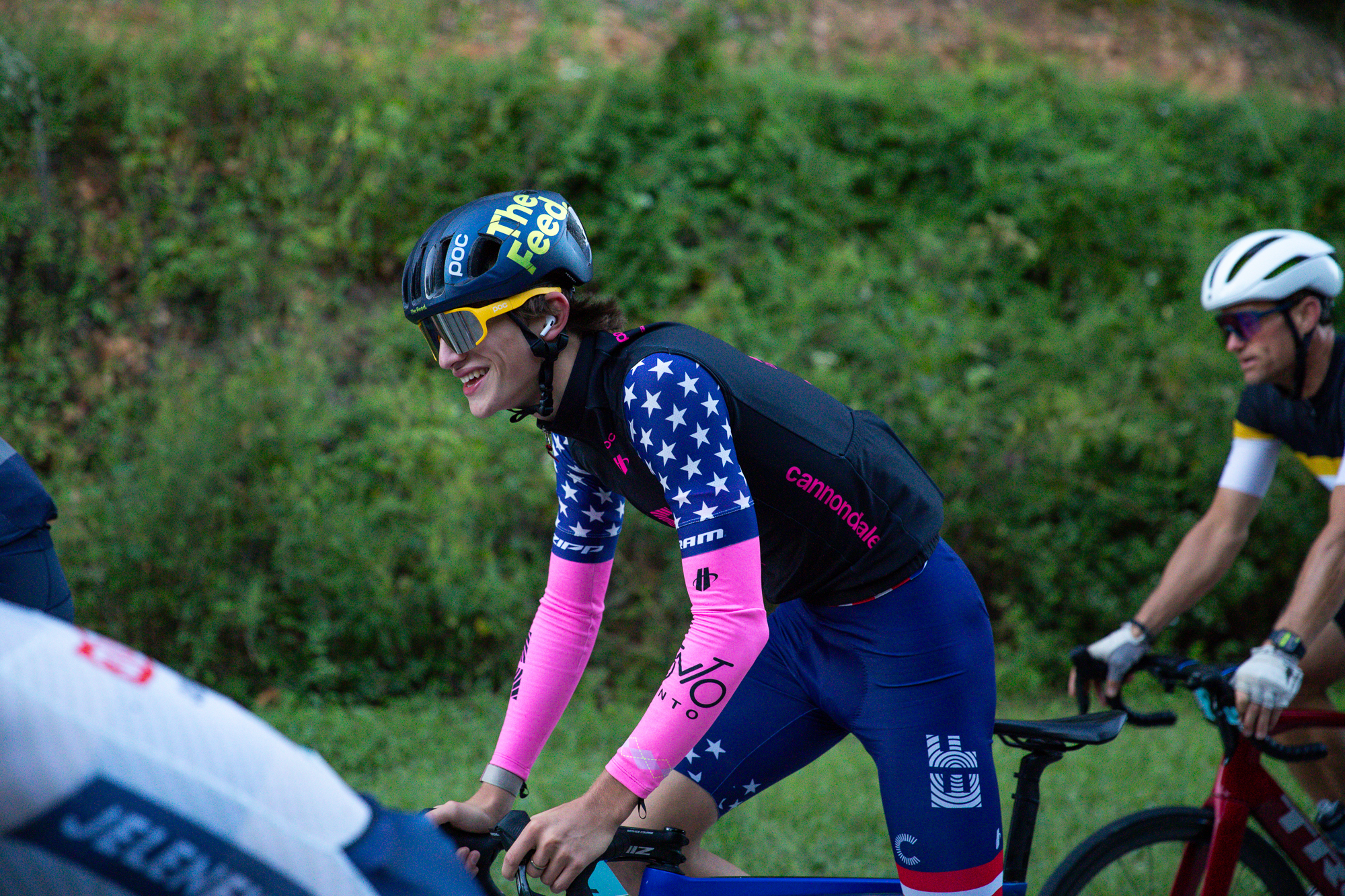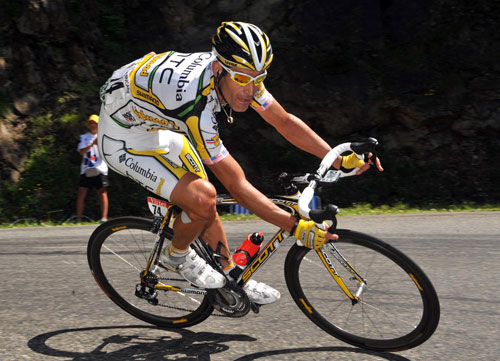
Road racing in the United States isn’t what it used to be. Gone are the days when WorldTour riders travelled from Europe to the United States for world-class stage races.
“It’s kind of disappointing to see all those races gone,” says George Hincapie.
After a long and decorated career, the celebrated domestique retired from professional road racing in 2012. Hincapie raced in 17 editions of the Tour de France, playing an instrumental role in the victories of Lance Armstrong, Alberto Contador and Cadel Evans. He also earned a victory at Gent-Wevelgem in 2001 and was a three-time U.S. national road racing champion. In 2012, he admitted to using performance-enhancing drugs, which led to him being stripped of two years of race results between 2004 and 2006. However, Hincapie has remained involved in the sport through various ventures, including owning a cycling team, organising events, running a cycling apparel company and helping his son, Enzo, achieve his cycling goals.
Cycling Weekly spoke to Hincapie, now 51, at the debut of his new gran fondo event, Gran Fondo Hincapie - Bentonville.
“I know a rider like me always looked forward to coming home. You know, back in the day [there was] Tour of Georgia, Tour of Utah, Tour of Colorado, Tour of California. We had tons of racing that we could plan our year around, and unfortunately, they don’t have that anymore.”
But that doesn’t mean that road riding in the United States is dead or that the United States doesn’t have a strong road presence. Athletes like Brandon McNulty, Kristen Faulkner, Matteo Jorgenson, and Sepp Kuss are proving to be dominant players on the world stage.
“On the positive side, there are a lot of really good American pros that are doing incredible over in Europe,” states Hincapie. “I think it’s just going to get better and better so in that sense, cycling is in a really good state in terms of how strong our talent is. But we need more races for sure.”
As amatuer and professional road races around the U.S. are discontinued, it’s hard to wonder what pathway is left for American riders looking to make the leap to professional road racing. While NICA has created a strong junior pathway for mountain biking, and gravel events are putting more emphasis on junior riders, road racing has not had the same luck. It appears that concerns around safety are pushing more and more people off roads and onto dirt.

Hincapie, who began riding with his dad when he was a child, recognises that people still want to ride and race on the road. And if presented with the opportunity for safe and well-organized events, people of all ages are eager to show up. That’s why he’s so keen on organising mass start events like the new Gran Fondo Hincapie - Bentonville, where families with children as young as 6 years old came out to experience the inaugural event in September.
Hincapie, who's a father of two, is also investing heavily in junior cycling as a way to grow the sport. His son, Enzo, is hoping to follow in his footsteps of becoming a professional cyclist. The 16-year-old recently won his sixth national title at the 2024 US Road National Championships. While Enzo is now proving his dominance in the U.S. junior races, Hincapie did not pressure him into riding.
“When he was ten, he hated hit,” Hincapie recalls. “I hated it too when I was a kid and my dad would be like, ‘no we’re riding.’ Then I got into it. Enzo’s followed sort of the same path.”
As the co-owner of the Gran Fondo Hincapie events, Hincapie has made it a point to prioritise junior cycling development.
“We try to put a Junior Challenge on with every event,” says Hincapie. The Junior Challenge is a race within the Fondo that offers a $10,000 prize purse for the fastest female and male riders on the Medio course. Juniors can either go for the overall race win, which offers $1,500 to first place, or they can focus on the two timed segments and earn the QOM/KOM $500 prize.
“In Greenville, we will have a Junior Challenge, as well, where we get a really solid field. So we have that racing element to try to get juniors out there. And even if they’re not hardcore cyclists, to go do the event and see if they like it, I think it’s really important for the foundation of cycling in the U.S. to still have road events. And that’s what we [Gran Fondo Hincapie] specialise in. We want to continue to promote road cycling as much as possible.”
While the road scene has changed drastically since the days when Hincapie raced, people still care about road racing. Riders like Tadej Pogacar and Remco Evenepoel are animating the races and attracting the attention of 3.5 billion people worldwide. On the women’s side, more than 2 million spectators tuned in to watch each stage of the Tour de France Femmes.
Hincapie believes that in order to rebuild road cycling in the U.S., communities need to reinvest in it.
“I think this community [Bentonville] is really going to play a big role in it. They’re investing so much in cycling here, and they’re doing a lot to bring events like ours in," he says. "Hopefully, with some racing in the future. You see so many kids on bikes here.”

Hincapie believes that the future of road cycling in the U.S. is bright, better even than it was when he was racing 20 years ago.
“I was part of the dark era of cycling,” says Hincapie. “I think the sport is in such a better place now. [Athletes] will never be confronted with those decisions that we were. They’re so focused on nutrition, technology, altitude training. In many ways, they’ve surpassed the benefits of doping by technology.
The best teams. they have the training so dialled in, their nutrition so dialled in, which is a great thing. The focus on technology and the evolution of the sport and they’re getting faster and faster.”
So, how do you re-grow road cycling in the United States? You invest in the future and provide opportunities for the younger generations to flourish.
“I think having such good American talent, men and women, is going to help inspire a new generation of cyclists," says Hincapie.
"You always see that the better the pros do, the more it seems like younger guys get into it or get inspired. I think that’s going to really help and we’ll see a lot more talent head over to Europe. “







